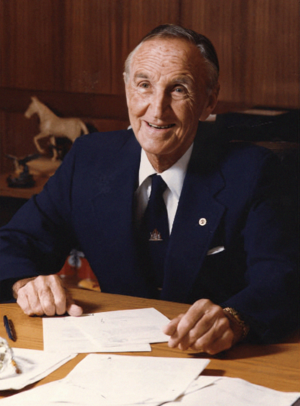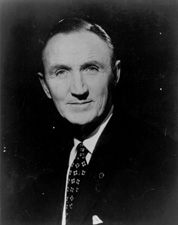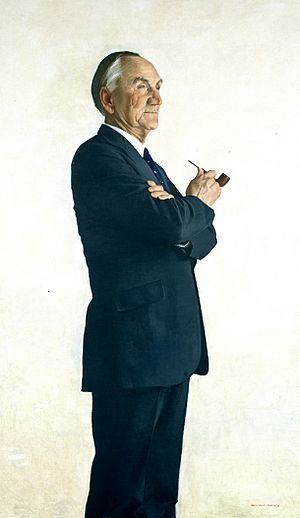Mike Mansfield facts for kids
Quick facts for kids
Mike Mansfield
|
|
|---|---|

Mansfield in 1985
|
|
| United States Ambassador to Japan | |
| In office June 10, 1977 – December 22, 1988 |
|
| President | |
| Preceded by | James Day Hodgson |
| Succeeded by | Michael Armacost |
| Senate Majority Leader | |
| In office January 3, 1961 – January 3, 1977 |
|
| Deputy | |
| Preceded by | Lyndon B. Johnson |
| Succeeded by | Robert Byrd |
| Chair of the Senate Democratic Caucus | |
| In office January 3, 1961 – January 3, 1977 |
|
| Preceded by | Lyndon Johnson |
| Succeeded by | Robert Byrd |
| Senate Majority Whip | |
| In office January 3, 1957 – January 3, 1961 |
|
| Leader | Lyndon Johnson |
| Preceded by | Earle Clements |
| Succeeded by | Hubert Humphrey |
| United States Senator from Montana |
|
| In office January 3, 1953 – January 3, 1977 |
|
| Preceded by | Zales Ecton |
| Succeeded by | John Melcher |
| Member of the U.S. House of Representatives from Montana's 1st district |
|
| In office January 3, 1943 – January 3, 1953 |
|
| Preceded by | Jeannette Rankin |
| Succeeded by | Lee Metcalf |
| Personal details | |
| Born |
Michael Joseph Mansfield
March 16, 1903 New York City, New York, U.S. |
| Died | October 5, 2001 (aged 98) Washington, D.C., U.S. |
| Resting place | Arlington National Cemetery |
| Political party | Democratic |
| Spouse |
Maureen Hayes
(m. 1932; died 2000) |
| Children | 1 |
| Education | University of Montana (BA, MA) University of California, Los Angeles |
| Signature | |
| Military service | |
| Allegiance | |
| Branch/service | |
| Years of service |
|
| Rank |
|
| Battles/wars | World War I |
Michael Joseph Mansfield (born March 16, 1903 – died October 5, 2001) was an important American politician and diplomat. He was a member of the Democratic Party. He served as a U.S. representative for Montana from 1943 to 1953. Later, he became a U.S. senator for Montana from 1953 to 1977.
Mansfield holds the record as the longest-serving Senate Majority Leader. He held this powerful position from 1961 to 1977. During his time as Majority Leader, he helped pass many important laws. These laws were part of the "Great Society" programs.
Born in Brooklyn, New York, Mansfield grew up in Great Falls, Montana. He joined the United States Navy during World War I by saying he was older than he was. After his military service, he became a history and political science professor. He taught at the University of Montana.
Mansfield was elected to the House of Representatives. He served on the House Committee on Foreign Affairs during World War II. In 1952, he won a seat in the Senate. He became the Senate Majority Whip from 1957 to 1961. When Lyndon B. Johnson became Vice President, Mansfield took over as Senate Majority Leader.
Later in his career, he disagreed with the increasing involvement in the Vietnam War. He supported President Richard Nixon's plan to bring U.S. soldiers home. After leaving the Senate, Mansfield became the US Ambassador to Japan. He served in this role from 1977 to 1988. He is the longest-serving American ambassador to Japan. He received the Presidential Medal of Freedom, a top civilian honor.
Contents
Early Life and Family
Mike Mansfield was born on March 1, 1903, in Brooklyn, New York City. His parents, Patrick and Josephine Mansfield, were immigrants from Ireland. His father worked many jobs to support the family. These jobs included construction, hotel work, and maintenance.
When Mike was three years old, his mother passed away. His father then sent Mike and his two sisters to live in Great Falls, Montana. They lived with his great-aunt and uncle. He went to public schools there and helped in his relatives' grocery store.
Military Service and World War I
At just 14 years old, Mike Mansfield left school. He lied about his age so he could join the U.S. Navy during World War I. He sailed on several ships overseas. However, the Navy found out his real age and discharged him.
After leaving the Navy, he joined the U.S. Army. He served as a private from 1919 to 1920. Then, he joined the U.S. Marine Corps. He was a Private First Class from 1920 to 1922. He served in places like San Francisco and Washington.
In 1921, he traveled to the Philippines. He spent a year there at a Marine Barracks. He also toured the coast of China with the Asiatic Fleet. His time in the Marines sparked a lifelong interest in Asia. He was honorably discharged in 1922.
Education and Teaching Career
After his military service, Mansfield returned to Montana in 1922. He worked for eight years in the copper mines of Butte. He shoveled ore and waste. Even though he never finished high school, he took entrance exams. He studied to become a mining engineer at the Montana School of Mines.
He met Maureen Hayes, a local teacher, who became his wife. She encouraged him to continue his education. With her help, he studied at the University of Montana. He took both high school and college classes. He earned his Bachelor of Arts degree in 1933. He then earned a Master of Arts degree in 1934. From 1934 to 1942, he taught history classes. He focused on Asian and Latin American history.
Serving in the House of Representatives
In 1940, Mansfield tried to become a Democrat for the United States House of Representatives. He lost that election. However, he ran again in the next election and won. He defeated Howard K. Hazelbaker. The previous representative, Jeannette Rankin, chose not to run again.
Mansfield served five terms in the House, from 1943 to 1953. Because of his military and academic background, he joined the House Foreign Affairs Committee. He went to China for President Franklin D. Roosevelt in 1944. He also represented the U.S. at a conference in Colombia in 1948. In 1951, President Harry S. Truman appointed him as a delegate to the United Nations in Paris.
During his time in the House, he supported price controls and a higher minimum wage. He also supported the Marshall Plan, which helped rebuild Europe after the war.
Becoming a U.S. Senator
In 1952, Mike Mansfield was elected to the Senate. He narrowly defeated the Republican senator, Zales Ecton. He served as Senate Majority Whip from 1957 to 1961. This meant he helped the Majority Leader, Lyndon B. Johnson, manage the Senate.
In 1961, Johnson left the Senate to become Vice President. Mansfield was then chosen as the Democratic floor leader. This made him the Senate Majority Leader. He held this position for 16 years, from 1961 until he retired in 1977. This makes him the longest-serving Majority Leader in Senate history. He was known for his humble and cooperative leadership style.
Views on the Vietnam War
Mansfield initially supported Ngo Dinh Diem, the leader of South Vietnam. However, after visiting Vietnam in 1962, his opinion changed. He told President John F. Kennedy that U.S. money was being wasted. He advised against further U.S. involvement in Vietnam. He was one of the first U.S. officials to express doubts about the war.
During the Johnson administration, Mansfield became very skeptical of the U.S. involvement in the Vietnam War. In 1965, he argued against increasing bombing in North Vietnam. He believed it would lead to a need for many more American soldiers.
When Richard Nixon became president in 1969, he sought Mansfield's advice on Vietnam. Mansfield supported Nixon's plan to gradually withdraw U.S. troops. By late 1972, Nixon had reduced American forces by 95%. The last troops left in March 1973.
Civil Rights and Legislation
As Senate Majority Leader, Mansfield played a role in passing important civil rights laws. In 1964, he helped bring the Civil Rights Act of 1964 to a vote in the full Senate. This was important because a committee had stopped similar laws before.
Mansfield voted for the Civil Rights Act of 1957, Civil Rights Act of 1960, Civil Rights Act of 1964, and Civil Rights Act of 1968. He also supported the 24th Amendment and the Voting Rights Act of 1965. These laws were crucial for protecting the rights of all Americans.
Mansfield Amendments
Mike Mansfield also introduced two important amendments that limited military funding for research:
- The Mansfield Amendment of 1969 stopped the military from funding research that wasn't directly related to a specific military purpose. This pushed the Department of Defense to support more practical, short-term research in universities.
- The Mansfield Amendment of 1973 specifically limited money for defense research through the Advanced Research Projects Agency. It stated that these projects must have a direct military use.
U.S. Ambassador to Japan
After retiring from the Senate in 1976, Mansfield was appointed ambassador to Japan in April 1977. President Jimmy Carter appointed him, and he continued in this role under President Ronald Reagan until 1988.
While serving in Japan, Mansfield was highly respected. He famously described the relationship between the U.S. and Japan as "the most important bilateral relationship in the world, bar none." He also helped build connections between his home state of Montana and Japan. For example, Helena, Montana's capital, became a sister city with Kumamoto in Japan.
Honors and Recognition
Many places and awards honor Mike Mansfield and his wife, Maureen.
- The Maureen and Mike Mansfield Library at the University of Montana is named after them.
- The Maureen and Mike Mansfield Center at the University focuses on Asian studies. It works to improve understanding and cooperation between the U.S. and Asia.
- The Mike Mansfield Federal Building and United States Courthouse in Missoula was renamed in his honor in 2002.
In 1977, Mansfield received the U.S. Senator John Heinz Award for Public Service. He also received the Laetare Medal from the University of Notre Dame. This is a very old and respected award for American Catholics.
On January 19, 1989, President Ronald Reagan awarded Mansfield the Presidential Medal of Freedom. This is the nation's highest civilian honor. In 1990, he received Japan's Order of the Rising Sun with Paulownia Flowers. This is Japan's highest honor for someone who is not a head of state.
In 1999, the Missoulian newspaper named Mansfield "The Most Influential Montanan of the 20th Century."
Later Years and Legacy
Mike Mansfield passed away at the age of 98 on October 5, 2001. He was survived by his daughter, Anne, and one granddaughter.
He is buried with his wife, Maureen, at Arlington National Cemetery.
See also
- List of United States political appointments that crossed party lines
- Maureen and Mike Mansfield Foundation
 | Lonnie Johnson |
 | Granville Woods |
 | Lewis Howard Latimer |
 | James West |



